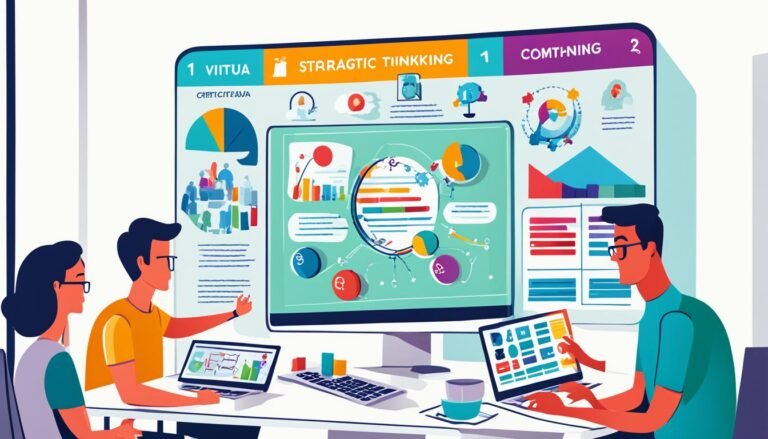Apprenticeships and Traineeships in Irish Business
Ever thought about how apprenticeships shape Ireland’s business future?
Since the 1970s, over 100,000 apprentices have been trained. The success rate is more than 80%. Apprenticeships and traineeships are key to growing the workforce. They offer qualifications at Level 5 or higher on the National Framework of Qualifications (NFQ).
These programs help people aged 16 and up move forward in their careers. There’s no limit on age. The Irish Government has made big steps in funding, like cutting fees by 33% for apprentices in higher education in Budget 2024.
There are different types of apprenticeships, from four-year craft ones to new ones in emerging fields since 2016. All apprentices get at least 50% on-the-job training. They also earn competitive salaries for at least two years.
Key Takeaways
- Over 100,000 apprentices trained in Ireland since the 1970s.
- Apprenticeships in Ireland have a success rate of over 80%.
- Budget 2024 reduces contribution fees for higher education apprentices by 33%.
- New apprenticeships mandate at least 50% on-the-job training and last a minimum of two years.
- Apprenticeships and traineeships are open to individuals aged 16 and above with no upper age limit.
Introduction to Apprenticeships and Traineeships
Apprenticeships and traineeships in Ireland are key to growing the workforce. They mix hands-on training with classroom learning. This approach boosts skills development and helps with talent acquisition strategies.
Apprenticeships last from two to four years. They combine on-the-job training with learning away from work. Apprentices earn a salary and gain valuable skills. They can earn qualifications from Level 6 to Level 10 on the National Framework of Qualifications (NFQ).
The cybersecurity apprenticeship is a Level 6 Advanced Certificate, lasting two years. It’s perfect for tech fans or those in cybersecurity.
Apprenticeships are available in many fields, from traditional trades to modern ones like ICT and hospitality. Employers set the apprentices’ pay during training. Apprentices don’t pay student fees, even for specialized areas like cybersecurity.
Traineeships are another big part of Ireland’s education system. Over 1,500 companies support them. These programs are flexible, fitting different industries and learning styles. They last from six to twenty months and focus on getting people into jobs.
A survey found that 61% of trainees got jobs within nine months after finishing their program.
There are over 70 traineeships in Ireland, including unique ones like local and national tour guiding.
- Apprenticeships in Ireland typically last 2-4 years.
- Apprenticeships involve at least 50% on-the-job learning.
- State funding covers off-the-job learning for apprentices.
- Employers pay apprentices during their training period.
- Apprentices are employed under formal contracts.
These programs have greatly helped the Irish economy. From 2014-2022, the State invested over €1 billion. This led to about 44,000 new jobs for apprentices and involved 9,000 employers. The goal is to create around €4.5 billion for the economy by 2025, with 10,000 apprenticeships a year.
Working together, industries and schools make sure apprenticeships and traineeships meet the job market’s needs. This helps trainees and apprentices get the skills they need for their careers.
The Role of Apprenticeship and Traineeships in Irish Business
Apprenticeships and traineeships are key in shaping Ireland’s workforce. They offer a clear path to gaining skills and meet the needs of different sectors. This is made possible through a strong partnership between employers and educational institutions.
Benefits to Employers
Employers gain a lot from apprenticeships and traineeships. They get access to skilled workers who are ready for the job from the start. This reduces the cost of hiring and training new staff. The training is practical and focused on the company’s goals.
Investing in trainees also helps keep them with the company. When employees see chances for growth, they stay longer and work harder. Programs like the ‘One More Job’ initiative help small businesses by covering some costs.
Impact on Workforce Development
These programs are great for both employers and the workforce. They make sure workers have the skills needed for the job. Apprentices spend a lot of time on the job, learning by doing.
Trainees can learn in ways that fit their schedule, like online or in person. This helps them keep their job while learning. As they move through the program, they get qualifications that make them more productive and happy at work.
Collaboration between Industry and Academia
Good apprenticeships and traineeships need a strong partnership between businesses and schools. This partnership keeps training up-to-date and relevant. It also brings new ideas and skills to the programs.
New apprenticeships like Industrial Electrical Engineering show how well these partnerships work. Employers and schools work together to create courses that mix classroom learning with real-world experience.
In summary, apprenticeships and traineeships are very important in Irish business. They help employers and workers a lot. The partnership between businesses and schools makes sure these programs stay useful and work well.
| Category | Details |
|---|---|
| Number of Trainee Participants (20 years) | 30,000 |
| Company Participants | Over 1,500 |
| On-the-job Learning | At least 30% |
| Apprentices Trained (Since 1970s) | Over 105,000 |
| Craft Apprenticeships New Registrations (2016) | 3,700+ |
Types of Apprenticeships in Ireland
Ireland offers a wide range of apprenticeships that meet the changing needs of the workforce. These programs are divided into two main types: Craft Apprenticeships and New Apprenticeships in Emerging Industries. They aim to improve skills and adapt to both old and new job needs.
Craft Apprenticeships
Craft Apprenticeships in Ireland last four years and lead to an Advanced Certificate (Level 6 NFQ). They mix on-the-job training with classes at technical institutes. You can find apprenticeships in many areas, like:
- Electrical, covering roles like Aircraft Mechanics (Level 6) and Industrial Electrical Engineer (Level 7).
- Construction, with options like Brick and Stonelaying (Level 6), and Plumbing (Level 6).
- Engineering, offering apprenticeships in Civil Engineering Technician (Level 6) and Manufacturing Engineering (Level 7).
- Agriculture and Horticulture, with roles like Farm Technician (Level 6) and Horticulture (Level 6).
- Biopharma, featuring Laboratory Analyst (Level 7) and Laboratory Technician (Level 6).
New Apprenticeships in Emerging Industries
New Apprenticeships meet the needs of modern industries like ICT, finance, and farming. These programs, from levels 5 to 10 on the NFQ, show how industries work together and offer flexible learning. They help both new and current workers improve their skills.
| Sector | Apprenticeship | NFQ Level |
|---|---|---|
| ICT | Software Developer | 6 |
| Finance | Accounting Technician | 6 |
| Farming | Farm Manager | 7 |
| Biopharma | Laboratory Analyst | 7 |
| Engineering | Equipment Systems Engineer | 9 |
The Irish apprenticeship system is strong in training for jobs, offering both old and new learning paths. This mix prepares a skilled workforce for today and tomorrow’s job needs.
Traineeships as Workforce Development Initiatives
Since 1995, traineeships have been key in Ireland’s workforce development initiatives. They are designed to improve job outcomes and keep people in their sectors. They focus on the skills development needs of industries.
Traineeships last from 6 to 20 months. They make sure trainees learn at least 30% of their skills on the job. This hands-on learning helps trainees get jobs after training. For example, the Greenkeeping traineeship lasts 48 weeks, and Animal Care is about 43 weeks long. Business traineeships, like Business Administration and Office Administration, last around 47 weeks.
Ireland offers over 75 traineeship programs across many sectors by the Education and Training Boards (ETBs). These programs keep getting updated to match the changing economy needs. Here are some examples of traineeship durations:
| Traineeship | Duration (weeks) |
|---|---|
| Medical Administration | 32 |
| Legal Administration | 51 |
| Healthcare Support | 49 |
| Dental Nursing | 87 |
| Youth Work | 78 |
| Aircraft Maintenance Technician | 119 |
| Aircraft Structures Technician | 79 |
These programs aim to meet industry needs and prepare participants for the workforce. They offer certifications from Levels 4 to 6 on the National Framework of Qualifications (NFQ). This shows Ireland’s strong focus on workforce development initiatives.
Support and Funding for Apprenticeships and Traineeships
Support and funding are key for apprenticeship and traineeship success in Ireland. They ease financial burdens on employers and give apprentices and trainees the resources they need.
Financial Supports for Employers and Apprentices
Many financial supports are available for employers and apprentices in Ireland. Employers get grants and incentives for apprenticeship programs. Gender-based bursaries help cover training costs. The National Training Fund and Exchequer contributions show the government and private sector’s shared commitment.
Studies reveal that over 90% of apprentices stay with their employers after training. Also, 90% of employers see a boost in productivity.
Bursaries and Grants
Bursaries and grants make apprenticeships and traineeships more accessible. The Traveller Apprenticeship Incentivisation Programme and the Apprenticeship Bursary for Care Leavers support under-represented groups. This ensures a diverse and inclusive workforce.
Traineeships often come from partnerships between local ETBs and industry. This ensures training meets employer needs. Programs like Skills to Advance and Springboard+ offer upskilling and reskilling. They help workers in fast-changing sectors.
“Skillnet Ireland supports employers in improving competitiveness, productivity, and innovation through tailored workforce training programs.” — Skillnet Ireland
Conclusion
Apprenticeships and traineeships are key in Irish business. They help develop skilled workers and boost the economy. The Industrial Training Act of 1967 has shown their value through wins like the gold medal in Aircraft Maintenance at the World Skills competition.
Recent plans aim to make these programs even better. They want to offer more chances and get more people involved. With 58 new apprenticeship types, there’s a focus on new industries and meeting global economic needs.
But, some trades like tiling and plastering face challenges. They need more attention to get more people interested. Improving these areas is crucial for the future.
To keep these programs strong, we need to keep making them better. This means better online tools, adding business skills to training, and maybe linking construction apprenticeships to the CAO. With ongoing support and development, apprenticeships and traineeships can keep building strong, adaptable workforces. This will help Ireland stay competitive worldwide.
Source Links
- A guide to apprenticeships in Ireland – Recruit Ireland.com A Guide to Apprenticeships in Ireland ¦ Recruit Ireland
- 3.5 Traineeships and apprenticeships
- Apprenticeships
- Apprenticeships & Traineeships – AMTCE
- Layout 1 copy
- Apprenticeships | Higher Education Authority
- Layout 1
- Everything you need to know about apprenticeships
- Layout 1
- Traineeship | Solas | Learning Works
- Work-based Learning – ETBI
- Skilling beyond Covid-19: Ireland’s approach to Apprenticeships | FE News
- JobsIreland.ie
- Financial Support for Apprenticeships
- Ireland: Policy developments on apprenticeship








